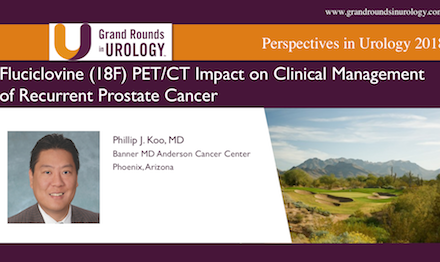Robert E. Reiter, MD, presented “PSMA Imaging: Beyond MRI in Prostate Cancer” during the 19th Annual Future Directions in Urology Symposium on August 11, 2018 in Colorado Springs, Colorado.
How to cite: Reiter, Robert E. “PSMA Imaging: Beyond MRI in Prostate Cancer” August 11, 2018. Accessed [date today]. https://grandroundsinurology.com/psma-imaging-beyond-mri-in-prostate-cancer/
PSMA Imaging: Beyond MRI in Prostate Cancer – Summary:
Robert E. Reiter, MD, provides a brief update on the benefits of prostate-specific membrane antigen (PSMA) imaging for staging and detecting prostate cancer, as well as the emergence of PSMA imaging in the United States.
Staging and Detecting Prostate Cancer with PSMA Imaging
PSMA allows physicians to accurately stage and detect metastatic and regional prostate cancer in up to 70% of patients with biochemical recurrence. This method also enables physicians to stage patients with high-risk disease prior to making a decision on whether they should continue to surgery or radiation.
Utilization of PSMA Imaging
PSMA is currently in widespread clinical use across Europe and Australia. There are also ongoing phase II and III clinical trials for PSMA imaging usage in the United States. Overall, Dr. Rieter hopes that PSMA imaging will positively transform the way physicians manage prostate cancer in the future.
About Dr. Reiter
Dr. Reiter is a Professor of Urology at the University of California, Los Angeles. He has specific clinical and research interest in improving prostate cancer imaging through functional MRI, as well as molecular imaging. Because of this, he has expert knowledge on PSMA imaging and its effect on the practice of prostate cancer treatment.
About the Future Directions in Urology Symposium
The Future Directions in Urology Symposium (FDUS) is an annual collaborative meeting with a faculty consisting of the top researchers, physicians, and educators in the field of urology. During FDUS, experts provide updates on recent developments and debate innovative management approaches in genitourinary cancers and urologic conditions. Subsequently, the experts devise consensus statements in accordance with the discussions held in the meeting.
In this video, Dr. Reiter discloses the thesis of the discussion he led during FDUS.
ABOUT THE AUTHOR
Robert E. Reiter, MD, MBA, is the Bing Professor of Urology and Molecular Biology and Director of the Prostate Cancer Treatment and Research Program at the David Geffen School of Medicine at the University of California, Los Angeles. He is currently the Principal Investigator of UCLA’s SPORE (Specialized Program in Research Excellence) program, a $12 million research grant from the National Cancer Institute to develop new diagnostic and treatment options for men with prostate cancer. Dr. Reiter’s clinical interests include robotic surgical management of prostate cancer and the use of both MRI and molecular imaging tools to manage this disease. His research is focused on the development of novel antibodies for both treatment and imaging of prostate cancer, as well as on the role of epithelial to mesenchymal transition in castration and treatment resistance. Dr. Reiter completed his undergraduate studies at Yale University and earned his medical degree at Stanford University Medical School.




